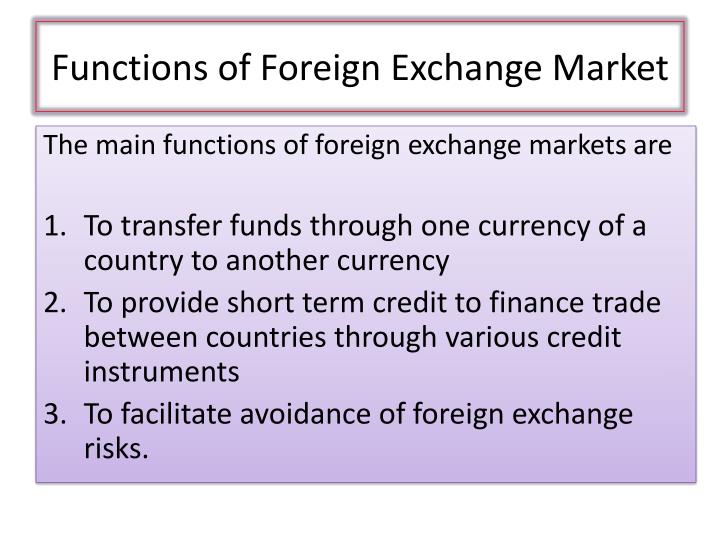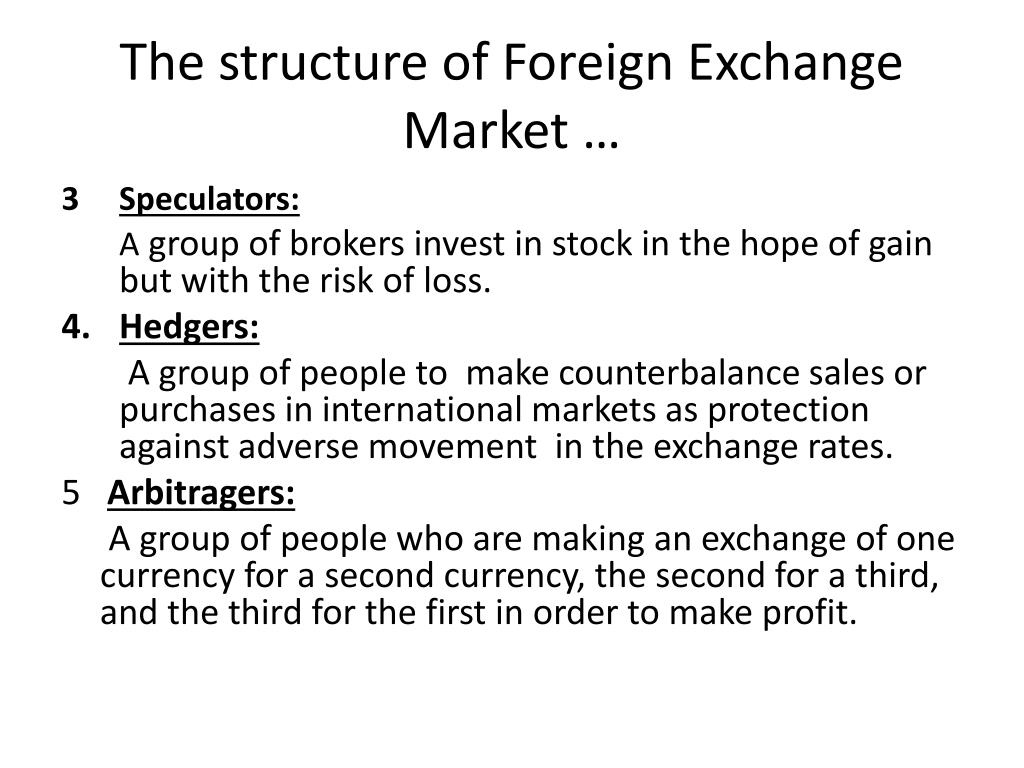Discuss the functions of foreign exchange market - The foreign exchange market, an intricate global network, stands as a pillar of international finance, facilitating seamless transactions and shaping economic landscapes. As we delve into its functions, we uncover a world of currency exchange, risk management, and investment opportunities that connect nations and drive global commerce.
From facilitating international trade to managing currency risk and providing liquidity for cross-border investments, the foreign exchange market plays a pivotal role in the global financial ecosystem.
Market Overview
The foreign exchange market, also known as forex or FX, is a global decentralized market where currencies are traded. It is the largest financial market in the world, with an average daily trading volume of over $5 trillion. The foreign exchange market is used by a wide range of participants, including banks, corporations, governments, and individual investors.
The foreign exchange market is used for a variety of purposes, including:
- To facilitate international trade and investment
- To hedge against foreign currency risk
- To speculate on currency movements
Participants in the Foreign Exchange Market
The foreign exchange market is a global market, with participants from all over the world. The major participants in the foreign exchange market include:
- Banks: Banks are the largest participants in the foreign exchange market. They provide foreign exchange services to their customers, including corporations, governments, and individual investors.
- Corporations: Corporations use the foreign exchange market to facilitate international trade and investment. They buy and sell foreign currencies to pay for goods and services, and to invest in foreign assets.
- Governments: Governments use the foreign exchange market to manage their foreign exchange reserves. They buy and sell foreign currencies to influence the value of their own currency, and to support their economic policies.
- Individual investors: Individual investors use the foreign exchange market to speculate on currency movements. They buy and sell foreign currencies in the hope of making a profit.
Types of Foreign Exchange Transactions
There are a variety of different types of foreign exchange transactions, including:
- Spot transactions: Spot transactions are the most common type of foreign exchange transaction. They involve the immediate delivery of currencies.
- Forward transactions: Forward transactions are contracts to buy or sell currencies at a specified price on a future date.
- Swap transactions: Swap transactions are contracts to exchange currencies at a specified price on a future date.
- Option transactions: Option transactions give the buyer the right, but not the obligation, to buy or sell currencies at a specified price on a future date.
Functions of Foreign Exchange Market: Discuss The Functions Of Foreign Exchange Market
The foreign exchange market is a global, decentralized market for the trading of currencies. It facilitates international trade, helps in managing currency risk, and provides liquidity for international investments. It plays a vital role in the global economy by enabling the exchange of currencies between countries, businesses, and individuals.
Facilitating International Trade
International trade involves the exchange of goods and services between countries. To facilitate this exchange, businesses need to convert their domestic currency into the currency of the country they are trading with. The foreign exchange market provides the platform for this conversion.
- Example: A US-based company importing goods from China needs to convert US dollars into Chinese yuan to pay for the goods.
Managing Currency Risk
Currency risk arises when the value of one currency fluctuates against another. Businesses and individuals involved in international transactions are exposed to this risk. The foreign exchange market allows them to hedge against currency risk by entering into forward contracts or options.
- Example: A UK-based company expecting to receive payments in US dollars in the future can enter into a forward contract to lock in the exchange rate today, protecting itself from potential losses due to currency fluctuations.
Providing Liquidity for International Investments
International investments involve the flow of funds across borders. The foreign exchange market provides liquidity for these investments by facilitating the conversion of currencies. It ensures that investors can easily enter and exit foreign markets, contributing to the growth of global capital flows.
- Example: An American investor purchasing stocks on the London Stock Exchange needs to convert US dollars into British pounds to make the investment.
Factors Affecting Foreign Exchange Rates
Foreign exchange rates are determined by a complex interplay of economic, political, and geopolitical factors, as well as the actions of central banks. These factors can have significant impacts on the value of currencies, affecting trade, investment, and economic growth.
Economic Factors
Economic factors play a crucial role in influencing foreign exchange rates. These include:
- Interest Rates: Higher interest rates in a country tend to attract foreign investment, increasing demand for its currency and strengthening its value.
- Inflation: Persistent inflation can erode the purchasing power of a currency, leading to its depreciation.
- Economic Growth: Strong economic growth indicates a country's economic strength and stability, which can boost its currency's value.
- Trade Balance: A country with a large trade surplus (exports exceeding imports) will typically have a stronger currency, as demand for its currency increases.
Political and Geopolitical Events
Political and geopolitical events can also significantly impact foreign exchange rates. These include:
- Political Stability: Political instability or uncertainty can lead to a loss of confidence in a country's currency, causing its value to decline.
- Government Policies: Government policies, such as fiscal or monetary policies, can affect economic growth and inflation, indirectly impacting foreign exchange rates.
- International Relations: Positive or negative relations with other countries can influence trade and investment flows, affecting currency demand and exchange rates.
Role of Central Banks
Central banks play a vital role in managing foreign exchange rates. They use various monetary policy tools, such as:
- Interest Rate Adjustments: Central banks can adjust interest rates to influence the flow of capital and stabilize exchange rates.
- Currency Intervention: Central banks may intervene in the foreign exchange market by buying or selling currencies to influence their value.
- Foreign Exchange Reserves: Central banks hold foreign exchange reserves to stabilize exchange rates and provide liquidity in the market.
Foreign Exchange Market Instruments

The foreign exchange market utilizes a variety of instruments to facilitate the exchange of currencies. These instruments serve different purposes and cater to specific market needs.
Discover more by delving into foreign exchange market research paper further.
Spot Contracts, Discuss the functions of foreign exchange market
Spot contracts are agreements to exchange currencies at the prevailing market rate on a specific date, typically two business days after the trade is executed.
You also can investigate more thoroughly about foreign exchange market reference books to enhance your awareness in the field of foreign exchange market reference books.
Forward Contracts
Forward contracts are agreements to exchange currencies at a predetermined rate on a future date. They allow businesses and investors to hedge against future exchange rate fluctuations.
Discover how foreign exchange market halal has transformed methods in RELATED FIELD.
| Feature | Spot Contracts | Forward Contracts |
|---|---|---|
| Settlement Date | Two business days after trade | Future date agreed upon by parties |
| Exchange Rate | Prevailing market rate | Predetermined rate |
| Purpose | Immediate exchange of currencies | Hedging against future exchange rate risk |
Currency Swaps
Currency swaps are agreements to exchange principal amounts in different currencies on a specific date and to exchange interest payments over a specified period. They are often used to manage currency risk or to arbitrage interest rate differentials.
Foreign Exchange Derivatives
Foreign exchange derivatives are financial instruments that derive their value from the underlying exchange rates. Common types include:
- Currency Options: Give the buyer the right, but not the obligation, to buy or sell a currency at a specified price on a future date.
- Currency Futures: Similar to forward contracts, but traded on standardized exchanges.
- Currency Swaps: Agreements to exchange cash flows in different currencies.
Regulation and Supervision of Foreign Exchange Market

The foreign exchange market is a vast and complex global marketplace, and as such, it is subject to a variety of regulations and supervisory measures. These regulations are designed to ensure the orderly functioning of the market, prevent abuse, and protect the interests of participants.
The regulatory framework for the foreign exchange market varies from country to country, but there are some common elements. In most countries, the central bank is responsible for overseeing the foreign exchange market and ensuring its stability. The central bank may issue regulations governing the conduct of foreign exchange transactions, and it may also intervene in the market to influence the exchange rate.
Role of International Organizations
In addition to national regulations, the foreign exchange market is also subject to a number of international agreements and organizations. These organizations play an important role in promoting cooperation and coordination among countries in the regulation of the foreign exchange market.
- The Bank for International Settlements (BIS) is an international organization that serves as a central bank for central banks. The BIS provides a forum for cooperation among central banks and promotes the development of sound financial practices.
- The International Monetary Fund (IMF) is an international organization that provides financial assistance to countries experiencing balance of payments problems. The IMF also promotes the development of sound economic policies and provides technical assistance to countries in the areas of foreign exchange management and financial regulation.
Measures to Prevent and Detect Foreign Exchange Market Abuse
The foreign exchange market is a highly liquid and volatile market, which makes it susceptible to abuse. There are a number of measures that can be taken to prevent and detect foreign exchange market abuse, including:
- Surveillance: Regulators can monitor the foreign exchange market for suspicious activity, such as large or unusual transactions or price movements.
- Enforcement: Regulators can investigate and prosecute individuals or firms that engage in foreign exchange market abuse.
- Education: Regulators can educate market participants about the risks of foreign exchange market abuse and the measures that can be taken to prevent it.
Wrap-Up

In conclusion, the foreign exchange market serves as a vital cog in the global financial machinery, enabling international trade, managing currency risk, and providing liquidity for investments. Its complex interplay of economic, political, and geopolitical factors makes it a dynamic and ever-evolving landscape. Understanding the functions of the foreign exchange market is crucial for businesses, investors, and policymakers alike, as it shapes the flow of capital and influences economic outcomes worldwide.
